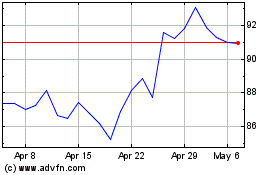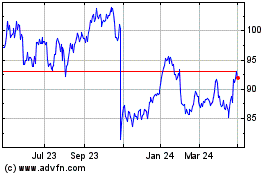Drugmakers Brace for Sales to Slow in China Amid Generic Drug Push
April 26 2019 - 8:19AM
Dow Jones News
By Denise Roland
As global companies struggle with an economic slowdown in China,
big drugmakers have a different problem: local competition is
starting to bite.
Executives at Sanofi SA and AstraZeneca PLC on Friday said they
expect strong growth in China to slow later this year as hospitals
switch to Chinese-made generic versions of some of their
top-selling drugs.
Multinationals have for years benefited from strong sales of
some of their older medicines in China, where brand recognition
gave them an edge over cheaper copies. Robust sales growth in China
was a factor in upbeat results for both companies in the first
quarter.
But that source of revenue is about to take a big hit. In an
effort to lower drug costs, the Chinese government earlier this
year rolled out a policy aimed at getting large public hospitals to
switch to generics. Beijing has also been raising standards for its
domestic drugmakers, closing the gap in quality with the
multinationals.
The policy required drugmakers to bid for contracts to become
the sole supplier of a certain drug to all public hospitals in 11
key cities. Multinational companies won just two of the 25
contracts, with the rest going to Chinese generic drugmakers. The
contracts came into effect around the end of the first quarter.
Two of Sanofi's best sellers in China, blood thinner Plavix and
Aprovel for lowering blood pressure, will be replaced by
Chinese-made drugs at the country's public hospitals. A company
spokesman said the cities affected represented around 30% of
nationwide demand for these products.
AstraZeneca also expects China sales to slow later this year.
While the British drugmaker won a contract for lung cancer drug
Iressa, its cholesterol-busting pill Crestor lost out to a
lower-cost version.
Pfizer Inc.'s Lipitor and Novartis AG's Gleevec were also among
the big-name drugs that lost out to Chinese-made generics.
China has recently made a raft of policy changes aimed at
improving access to medicines for its 1.4 billion population. Some
of these -- such as speedier approvals of new drugs -- are
benefiting multinational companies.
"The good news here is that China is very much focusing on
innovation," said AstraZeneca Chief Executive Pascal Soriot. He
said some of the company's new drugs, including Tagrisso for lung
cancer, were performing well in China.
Sanofi is also counting on new drugs to drive growth in China. A
spokesman said seven of its drugs were included in a list of
medicines that could be eligible for a faster-than-normal approval
by the Chinese regulator.
The French company on Friday said business net income, a closely
watched measure that strips out certain one-time items, rose 10.5%
to EUR1.77 billion ($1.97 billion), while sales rose 6.2% to
EUR8.39 billion in the three months to March 31.
Both measures beat analyst expectations, sending shares up 3.5%
in early trading, although Sanofi's Chief Financial Officer
Jean-Baptiste Chasseloup de Chatillon said the company had opted
not to raise its full-year guidance because of the anticipated
slowdown in China.
AstraZeneca said its core operating profit, an adjusted measure,
climbed 84% to $1.65 billion in the quarter because of stronger
margins and higher product sales, which rose 10% to $5.47 billion.
AstraZeneca shares climbed 0.1% Friday morning.
Write to Denise Roland at Denise.Roland@wsj.com
(END) Dow Jones Newswires
April 26, 2019 08:04 ET (12:04 GMT)
Copyright (c) 2019 Dow Jones & Company, Inc.
Sanofi (EU:SAN)
Historical Stock Chart
From Mar 2024 to Apr 2024

Sanofi (EU:SAN)
Historical Stock Chart
From Apr 2023 to Apr 2024
